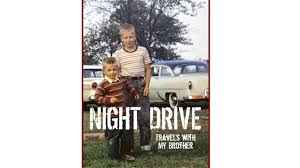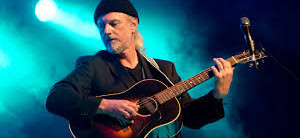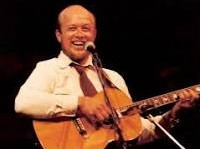I don’t know why I write these lines
It’s not like I could send you the letter
It’s that I love you more after all this time
It’s that I wish I’d shown you better
— Night Drive
First there was Night Drive the song. Now there’s Night Drive the book. Both celebrate the love of one brother for another brother.
Garnet Rogers released the song — a haunting autobiographical dream/vision set to music — as the title track of his 1996 album. It gave me goosebumps when I first heard the recording; it left me weak in the knees and speechless the first time I saw him perform it at Maryhill Tavern on home ground in southwestern Ontario.
Subtitled Travels with My Brother, the memoir is the book Rogers was destined to write. ‘I had to write it, I needed to write it,’ he confirmed in a telephone conversation from the horse farm outside of Brantford where he lives with Gail, his wife of 35 years.
The long-awaited memoir unfolds like cinematic oral history, beginning with the lads growing up in and around Hamilton in the 1950s, discovering music in the 1960s and forming a band. Most of the book covers the decade Garnet and Stan toured North America (usually with a bass player) between June 1973, when Garnet graduated from high school, and 2 June 1983 — the day the music died, at least for Stan.
I had a dream; it seemed so real
Its passing left me shaking
I saw you here behind the wheel
On this very road I’m taking
Night Drive is many splendid things. It is Garnet’s deeply affectionate tribute to his brother as well as to their parents. It offers an intimate full-bodied portrait of Stan, complete with bruises and blisters, scabs and scars.
It ‘shines a light’ (Garnet’s phrase) on the people (musicians, club and coffeehouse owners, longtime booking agent, festival artistic directors, theatre managers, billets and fans) who graciously helped Stan and Garnet create music against incredible odds at a time when eking out a living as independent folksingers without the support of a major record label was brave, unbridled lunacy. Unconditionally supported by their mom and dad, Stan and Garnet were leaders in milling the business template for entrepreneurial independent acoustic musicians.
The book sets the record straight with respect to the older brother Garnet knew and loved despite intensely volatile differences. Likewise, it settles scores with respect to those Garnet believes did Stan wrong, or gleefully rode on his artistic shirttails after he died and became a flourishing cottage industry. In many instances, Garnet declines to name names, deciding I suspect to avoid libel claims rather than protect the self-serving guilty.
Garnet has always had a hard time reconciling the brother he knew so well with the legend manufactured by the myth-making machinery that transformed the thorny artist into a sanitized commodity. His memoir is a defiant account of reclaiming his brother as he was rather than as memorialized by others after Stan perished in a fire aboard an Air Canada jet on the tarmac of Cincinnati Airport. (I was city editor at the Timmins Daily Press at the time and I still shudder to remember the horror and sadness that engulfed me when I read the Canadian Press wire story confirming Stan’s death. For me, it was a front page tragedy.)
Hurtling westward through the prairie night
Under the spell of motion
Your eyes were clear and bright in the dashboard light
Dreaming of the western ocean
The dusty towns left far behind
Mountains drawing ever nearer
Your face was then
As it was tonight
Ever young
Ever clearer
If you think being a pioneering, modern-day troubadour on the endless highway constituted high romantic adventure, Night Drive serves as a cautionary tale. It places readers smack dab in the car or van, not to mention the piss-stained beer joints and flea-bag hotels that defined life on the road. Much of the time, they live hand-to-mouth, with wallets bare and bellies empty for days on end. Thank God for the booze, which never dried up. ‘People don’t realize how miraculous it was for Stan to write those extraordinary songs in the midst of all the chaos, poverty and violence,’ Garnet asserted with a note of wonder still in his voice. ‘There was so much violence around us and so much stupidity within us.’ He has never spoken truer words to me in the 35 years I’ve known him.
Garnet explained he read a lot of First and Second World War memoirs in preparation for writing his own memoir. He learned well. Night Drive is the equivalent of a blood-and-guts account of mortal, hand-to-hand combat in rat-infested trenches. The historical chronicles also suggested an approach. ‘I didn’t set out to be a [music] historian. I don’t have the big [cultural] picture. I’m interested in the soldier farting in the tank while crossing the desert.’ Indeed, there’s lots of flatulence, not to mention puking and pissing, in Night Drive.
Despite the interminable litany of misery chronicled in Night Drive, it’s a hilariously raucous, delightfully bawdy joyride. I lost count of the times I had to stop reading, I was laughing so hard. I mean great belly laughs. Squeamish politically correct readers beware; the same for readers with tender tummies and delicate sensibilities. The wildest, most bizarre, most surreal or most absurd stories you’ve ever heard about Stan and his Band of Merry Pranksters do not prepare you for the 735-page, episodic, magnum opus. Think of On the Road meets Animal House.
WARNING: You will need to rest your elbows on the arms of chairs in order to support your wrists while reading the autobiographical tome because you won’t be able to put it down — it’s that compelling. With the exception of eating and sleeping I did little else for the four days it took to complete. I never went into the washroom without it.
If my memory serves
The Northern Lights were shining
You lit a smoke
We shared some wine
We watched the sky in wonder
Your laughter echoes all this time
In that high and wild blue yonder
If you are not reduced to tears from laughter, brace yourself to weep when Garnet prays for dear friends who have passed on. Those familiar with his songs will already know how he can soothe an aching heart or comfort a wounded soul.
Night Drive offers a fascinating behind-the-scenes, in-the-studio examination of Stan’s extraordinary catalogue. His canon is not only one of the most impressive in Canadian music irrespective of genre; it’s one of the most enduring in all of modern folk music.
Here’s but one example of Garnet’s insight and eloquence, in this case Northwest Passage, one of Stan’s dozen or so masterworks. ‘People can make of the song what they will. It is very personal for me, and when I hear it I am back again in that smelly smoke-filled van, with two other tired and lonely and frightened young men, with too many miles before us. Too many miles, and too many shows, and too little sleep before we got to turn the nose of the van around and head back east to hearth and home.’ Wow, that’s fine, fine descriptive writing that peels the skin off the emotional onion with a razor blade.
As time has passed
Your life has seemed less real
But these night drives
Bring you nearer
I have been listening to Canadian acoustic music for 50 years and writing about it for 35 years — from the sidelines. Meanwhile, Garnet got down and dirty as a significant player; Night Drive puts readers on the field in the mud, the sweat and the blood. In gratitude, I would like to take this opportunity to say a little about the Garnet Rogers I know.
I’ve enjoyed a long professional history with Garnet. I first met him in about 1984 when I was covering arts and other beats for the Brantford Expositor and he was performing at the Brantford Folk Club. I don’t recall whether he was honouring one of Stan’s booked appearances or had already begun carving out his own career. We talked about Stan and the solo musical journey upon which he had just embarked with more than a little trepidation.
It was the first of many conversations we shared. In addition to interviewing Garnet prior to area concert appearances while I was an arts reporter for the Waterloo Region Record, I reviewed most of those concerts in halls, churches, theatres and at festivals. I also reviewed his dozen solo albums. Garnet is a journalist’s dream; he’s intelligent, funny as hell and eloquent. He’s open and candid when you have gained his trust. I never published a discouraging word with respect to either the man or his art.
Most of our conversations were conducted over the phone. Garnet was never reserved when it came to talking from the heart. Over the years we discussed how difficult it was for him to move on personally and professionally after his brother’s death, including his bouts of clinical depression and destructive thirst for alcohol. I was one of the first writers to whom he confided about writing original songs. He had been in the habit of surreptitiously introducing original material by attributing it to obscure Australian folksingers.
I conducted the off-camera interview when he appeared (on my recommendation) on Listen Up, a 39-part TV show devoted to Canadian singer/songwriters originally broadcast on VISION TV.
Garnet is unreservedly kind to those he respects. He once paid me the enormous compliment of telling me he thought I was one of the two best acoustic music reviewers in North America — the other being Scott Alarik, folk musician, folk critic of The Boston Globe for many years and author of Deep Community: Adventures in the Modern Folk Underground.
He’s also unreservedly generous. During my first interview with James Keelaghan years back when he was an emerging songwriter from Calgary, he told me Garnet had given him his first quality guitar — I believe it was made by Grit Laskin — just because Garnet believed the younger songwriter should have it. Similarly, when I lost my personal library and music collection in a house fire 25 years ago, Garnet sent me a care-package collection of CDs spanning his catalogue.
So tonight I’ll wish upon these stars
As they rise upward to guide me
That I’ll see you here
Just as you are
Now, as then, beside me
Scares me how the years have flown
Like the leaves drift in September
They’ve lost sight of you as your legend’s grown
But this road and I
We remember
Night Drive is a love letter to his dear late brother, a postcard home, an anthem to independent music when Canada came of age creatively and artistically, and a prayer of remembrance to those who pay the music forward.
Garnet doesn’t conclude his memoir with Stan’s death. He recounts saying goodbye to his brother after they performed at the Kerrville Folk Festival. Garnet had made arrangements to return home early. Then he recalls travelling across this vast country with Stan years before, forever westward into the thin, fine line of the distant horizon. ‘I wanted to leave us out there on the road,’ Garnet said.
The origins of Night Drive extend back more than three decades. He wrote the first piece on airmail paper in St. John’s shortly after Stan’s death. Fragments can be found scattered throughout his spiral notebooks.
He has devoted most of the last two years to writing, rewriting, rewriting again and editing. ‘I reached the point where it came quickly,’ he confirmed. ‘I started looking forward to it.’ All the while he was field testing passages at concerts.
Garnet spent a decade performing, touring and recording with Stan. He has spent the past 35 years carving out a popular solo career which, in his lifetime, exceeded by far the success Stan enjoyed in his lifetime.
Nonetheless, fans should not expect a sequel. ‘The career that followed has not been nearly as much fun,’ he acknowledged. ‘No one has had my back. When something bizarre happened there was no one to jump in the van with and tear away.
‘Doing my own music has been satisfying, but it didn’t feel like an adventure. The magic went out of it.’
Garnet has written, recorded and performed some wonderful and amazing songs as a solo artist. However, in a very real sense, the music also died for him 33 years ago when his big brother perished and became a legend.
Thankfully, we now have the story that puts human flesh on mythic bones. Stan wouldn’t have it any other way.
Night Drive is available in both hardcopy and electronic versions at concerts and online through Rogers’ website.
Watch Garnet perform his haunting autobiographical anthem Night Drive on Listen Up, a TV show on Canadian singer/songwriters for which I wrote and conducted off-camera interviews.
Garnet Rogers Concert & Book Launch
Live On Stage at Princess Original On Stage
24 September at 8 pm
Advance tickets now on sale




